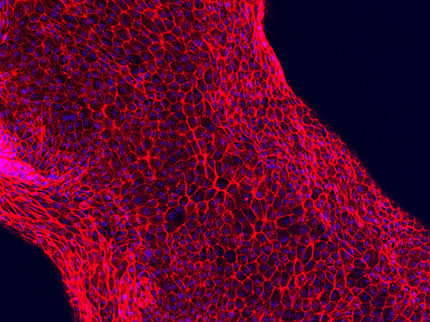Innovative implant against sudden deafness wins start-up funding competition
Implant releases active ingredients locally
The Institute for Biomedical Translation (IBT) aims to translate cutting-edge biomedical research into clinical practice. To this end, the IBT has awarded start-up funding totalling more than 1.6 million euros in the second funding round. Nine research projects took part in the final round of the competition for the funding, and the jury has now selected two winners. One of them is the Bacta implants project led by Dr Verena Scheper, a scientist at the Department of Otorhinolaryngology (ENT) at Hannover Medical School (MHH). Together with her team, she is developing implants for the treatment of hearing disorders. The project is now being supported by the IBT with around 770,000 euros over two years. ‘This funding enables us to conduct a clinical study to prove that our idea works,’ says PD Dr Scheper. MHH President Professor Dr Michael Manns is also delighted with the success: ‘The translation of cutting-edge clinical research into application is the driving force for better patient care. The IBT accelerates this transfer as an incubator through start-up funding.’
Implant releases active ingredients locally
Bacta Implants enables the targeted release of active substances into areas of the body that are difficult to access. The first goal of the platform technology is to combat hearing loss. Using 3D printing with a bio-plotter, an elastic implant is created from silicone that contains an active ingredient to combat hearing loss and is precisely customised to the individual patient's anatomy. The implant can be inserted under local anaesthetic via a small incision on the eardrum directly into the so-called round window niche, which connects the middle ear with the inner ear. Until now, sudden hearing loss has been treated with tablets or injections. The problem with this is that only a small proportion of the active ingredients used reach the inner ear. Therefore, either the healing effect is too low or the dose must be so high that undesirable side effects occur. ‘Both can be avoided with our implant because the active ingredient does not have to take a diversion and can be targeted to the right place,’ emphasises PD Dr Scheper.
Individual treatment trials already successful
The round window implant (RNI) has already been tested effectively on patients with sudden hearing loss in individual treatment trials. However, before PD Dr Scheper and her two colleagues from the ENT clinic can set up their own company and put their innovative development into practice, the team must prove in a clinical trial that the RNI actually delivers the medication to the inner ear. ‘This first study is a prerequisite for us to be able to conduct a marketing authorisation study,’ says the scientist. Now she and her colleagues are delighted that the prize money from the IBT start-up competition will provide them with the financial means to prove this.
Three projects each from the MHH, the University Medical Centre Göttingen (UMG) and the Helmholtz Centre for Infection Research (HZI) took part in the second round of the Institute for Biomedical Translation (IBT) Lower Saxony competition. In addition to the Bacta Implants project, the HZI project PROTON convinced the jury. It is developing a technology to prevent dangerous bacterial infections and will receive funding of around 890,000 euros.
Other news from the department business & finance
Most read news
More news from our other portals
Something is happening in the life science industry ...
This is what true pioneering spirit looks like: Plenty of innovative start-ups are bringing fresh ideas, lifeblood and entrepreneurial spirit to change tomorrow's world for the better. Immerse yourself in the world of these young companies and take the opportunity to get in touch with the founders.























































